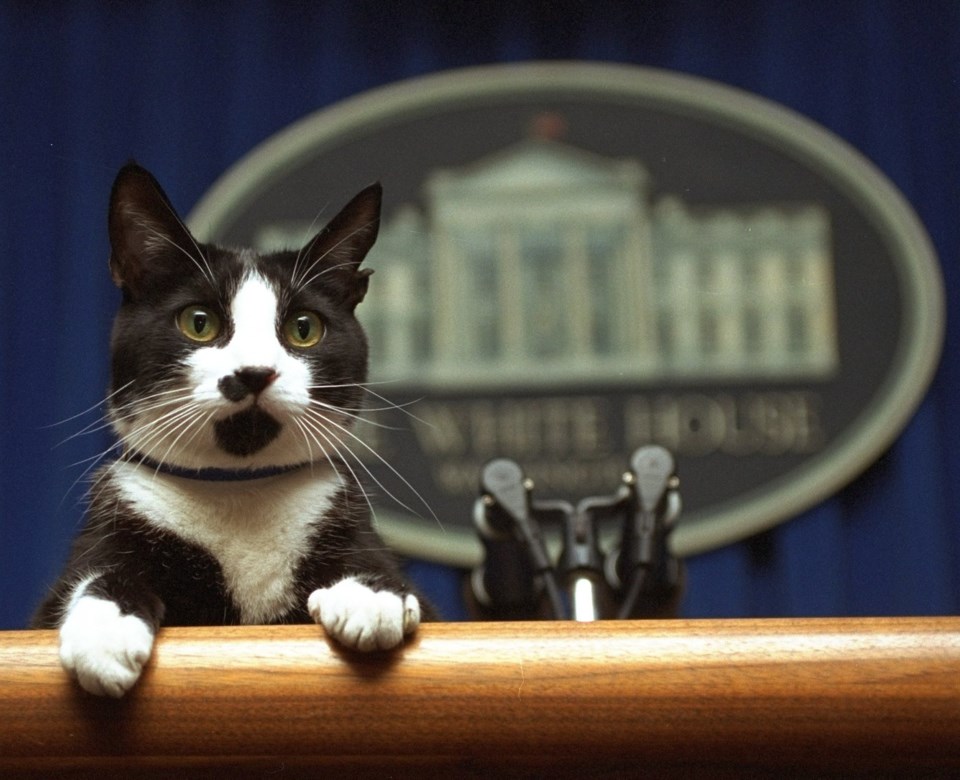WASHINGTON (AP) — The lead-up to the 2024 election was all about cat owners. But in the end, the dogs had their day.
President-elect won slightly more than half of voters who own either cats or dogs, with a big assist from dog owners, according to AP VoteCast, a survey of more than 120,000 voters. Dog owners were much more likely to support the Republican over Democratic Vice President . Cat owners were split between the two candidates.
About two-thirds of voters said they own a dog or cat, but pet owners don't usually get much attention from politicians. This year, however, past comments by Trump's running mate, Ohio Sen. about “childless cat ladies” — and signed her Instagram endorsement of Harris in September
Harris did end up decisively winning support from women who owned a cat but not a dog. Still, those voters were a relatively small slice of the electorate, and pet owners as a whole did not seem to hold Vance's remarks against the GOP ticket.
Harris found success with female cat owners, but not men who owned cats
Childless or not, women who only owned a cat were more likely to support Harris than were dog owners, or voters who had a cat and a dog. About 6 in 10 women who owned a cat but not a dog supported Harris, according to AP VoteCast. She did similarly well among women who did not own either kind of pet.
Her success with women who were cat owners didn't translate to men. Trump narrowly won the backing of men who only owned cats; slightly more than half of these voters supported him.
It’s impossible to know how much Vance’s comments played into Harris’ success with women who only had cats, but most of those voters had a “very” or “somewhat” unfavorable opinion of Vance. They were more likely to dislike than women who only own dogs or women who have cats and dogs. They were also more likely than female voters overall to have a negative view of Trump and the Republican Party.
A simple explanation for the divide is that women who were cat owners were never very inclined to vote for Trump, even before Vance's comments resurfaced. According to AP VoteCast, only about 4 in 10 female voters who only owned a cat were Republicans.
More voters are dog owners, and Trump did better with them
If anything, the result of the 2024 election suggests that Democrats may have some work to do with dog owners. Voters who owned a dog, including those who owned a cat as well, were more likely to support Trump, and they made up a bigger share of the electorate.
Cat owners who didn't also have a dog made up only about 15% of voters. About 2 in 10 voters, by contrast, owned both kinds of pets, and about 3 in 10 only had a dog, which meant that dog owners were a much more influential voting bloc. Trump won about 6 in 10 men voters who owned a dog but no cat, and about half of female voters in this group.
While Trump’s campaign did not make the same appeals to dog owners that Harris’ campaign did with cat owners, Trump did were stealing and eating dogs and cats. But, as with the Vance remarks, there is no evidence that Trump’s statements ultimately influenced pet owners’ decisions. In fact, party loyalty was likely a major factor — about 6 in 10 men who only own dogs identified as Republicans, as did about half of women who are dog owners.
So Democrats looking to make inroads with dog lovers may not have an easy fix ahead. But it's also true that neither Trump nor Harris own pets, which meant no dogs accompanied the presidential candidates on the campaign. It's possible that future campaigns could benefit from a little more bark.
__
AP VoteCast is a survey of the American electorate conducted by NORC at the University of Chicago for Fox News, PBS NewsHour, The Wall Street Journal and The Associated Press. The survey of more than 120,000 voters was conducted for eight days, concluding as polls closed. Interviews were conducted in English and Spanish. The survey combines a random sample of registered voters drawn from state voter files; self-identified registered voters using NORC’s probability based AmeriSpeak panel, which is designed to be representative of the U.S. population; and self-identified registered voters selected from nonprobability online panels. The margin of sampling error for voters overall is estimated to be plus or minus 0.4 percentage points. Find more details about APVoteCast’s methodology at
Linley Sanders, Humera Lodhi And Annie Ng, The Associated Press




